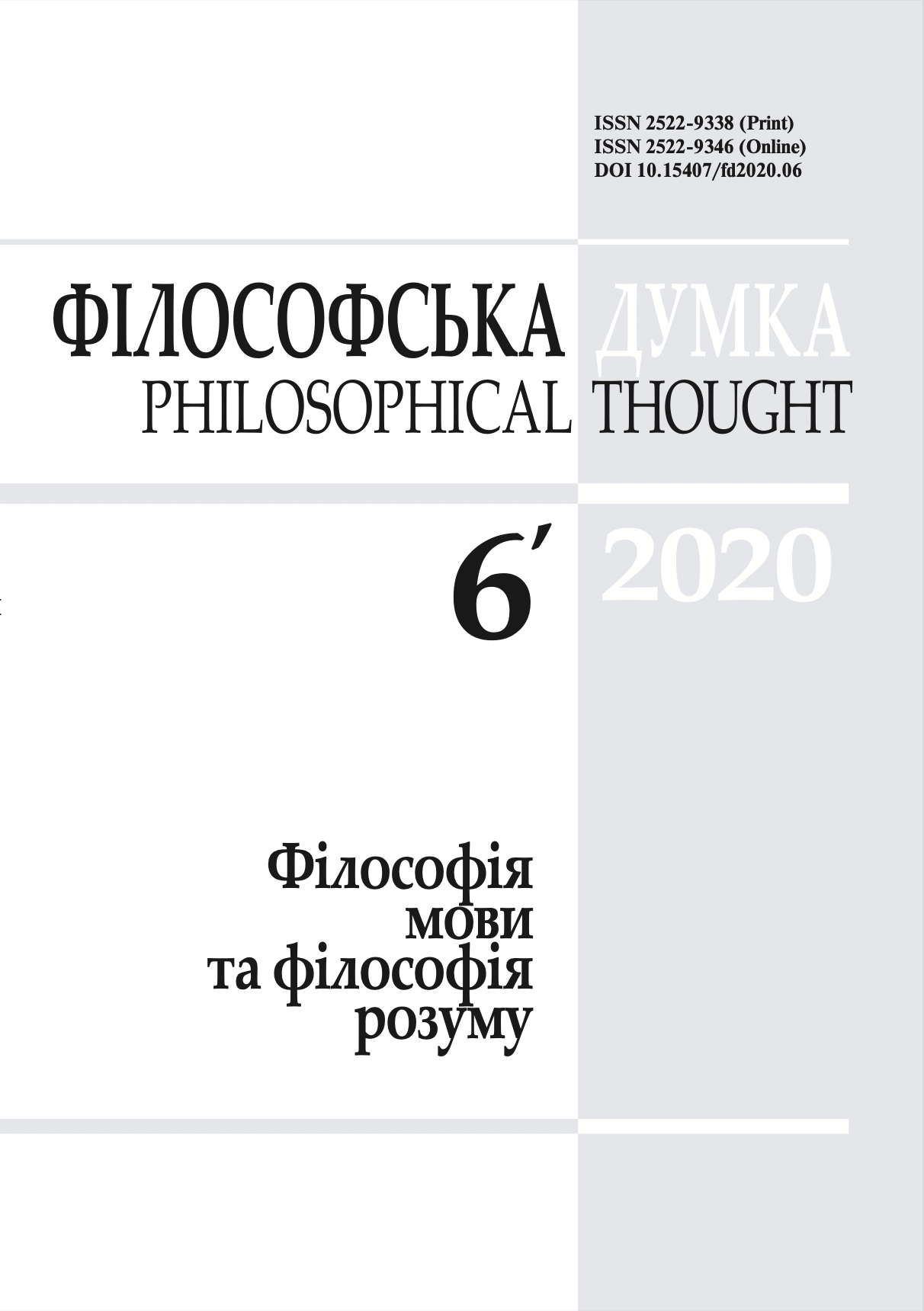Whether the general brain theory is already existing, or How does the phenomenon of information explain mind-body
Analytics of subjectivity and intersubjectivity
DOI:
https://doi.org/10.15407/fd2020.06.058Keywords:
attributive properties of objective reality, Mind & Body Problem, subjectivity, information, brain neural networks, “bottom-up causality”, “top-down causality”, freedom of choice, from-within causalityAbstract
Since Descartes “separation” of the Soul from the Body, we observe a complete confusion in their causal, functional, and semiotic relationships. However, in modern knowledge (about the informational activity of the human brain, the functional and causal properties of its neural networks, the functions of psychic phenomena during the processing of infor- mation in it, about the causal “ability” of information) it is time to put an end to this problem. Here, in order to explain what I am talking about, I will use the notion of “information” (which had been unknown by Descartes) regarding the “dispute” between Mind & Body (the Physicality and the Mentality) for “the right” to be a more fundamental ontology of Reality. I will do this by introducing an “arbitrator” — the Objective Reality. This goal is achieved through the study of information activity of the human brain. In the process of this study, it turns out that the information activity of the brain in principle cannot be carried out without mental phenomena.
That is, it turns out that the classical physical causality, which operates in the neural networks of the brain, is not able, by itself, without mental phenomena, to implement the information operations that the human brain actually performs. It also turns out that the functional inclusion of mental phenomena (at least, the phenomena of subjective evaluation and mental images) in the neurophysiologic (by and large, physical) activity of the brain explains the pos- sibility and necessity of functional inclusion in this information processing the phenomenon of freedom of choice. After all, the processing information in the brain through mental phenomena allows more than one degree of freedom than it is “allowed” by any physical process.
References
Vakhtel, A. (2017). Conscious experience and anti-reductionism in the philosophy of David Chal mers. Philosophical Thought, 3, 41-56.
Dubrovsky, D.I. (2007). Consciousness, Brain, Artificial Intelligence. Moscow: Strategy.
Kebuladze, V. (2009). Intentionality as a characteristic of empirical mental acts and as a transcendental condition of the possibility of experience. Philosophical Thought, 4, 84-91. Round table: Philosophy of Mind (2016). Philosophical Thought, 2, 6-29.
Nicholls, J.G. et al. (2003). From Neuron to Brain. Moscow: URSS.
Penfield, W., Roberts, L. (1964). Speech and brain mechanisms. Moscow: Medicine.
Sepetiy, D. (2011). Consciousness as subjectivity: the secret of Self. Zaporizhia, ZDMU.
Sepetiy, D. (2016). Why there is a "Hard problem of consciousness" Philosophical Thought, 2, 30-38.
Soloviov, O.V., Litsoeva N.V. (2016). The Man as a cause: About the inclusion of information phenomena in the objective activity of the brain in the form of mental phenomena. Psychology and Personality, 1, 31-42.
Soloviov, O.V., Soloviov, O.S. (2009). On the fundamental difference between determinism in the information networks of the human brain and computers. Artificial Intelligence, 3, 11-22.
Soloviov, O. V. (2007). The human self and its untruth. Kyiv: Nika-center.
Soloviov, O. V. (2008a). Semiotics of the human brain. Luhansk: VNU.
Soloviov, O. V. (2008b). Human "Self" in the "lumen" of the physical law. Questions of Philosophy, 11, 52-64.
Soloviov, O. V. (2012). Psychosemantic regulation of the functional systems of people: author. dis. doctor of psychol. sciences. Ins-t psychology named after G.S. Kostyuk, Kiev.
Soloviov, O. V. (2014). On the essential connection between the phenomena of energy and information. Philosophical Investigations, 20, 83-102.
Soloviov O.V. (2017). What "average brains" should be, or how free choice can make history. The Day, 102-103.
Soloviov O.V. (2019). The biological expediency of the activity of neural networks of the brain is not explained solely by physiological patterns. Physiological Journal, 65, 3, 53-64. Hacken, G. (2001). .Principles of brain functioning: a synergistic approach to brain activity, behavior and cognitive activity. Moscow: Per Se.
Hubel, D., Wiesel, T. (1984). Central mechanisms of vision. Brain. New York. 167-197. Damasio, A. R. (1999). The Filing of What Happens. New York, San-Diego, London: Harcourt Brace & Company.
Chalmers, D. (1996). The Conscious Mind. Oxford; New York: Oxford University Press. Friston, K. (2012). A Free Energy Principle for Biological Systems. Entropy, 14, 2100-2121; https://doi:10.3390/e14112100
https://doi.org/10.3390/e14112100
PMid:23204829 PMCid:PMC3510653
Mountcastle, V. (1978). An Organizing Principle for Cerebral Function: The Unit Model and the Distributed System. In: The Mindful Brain. Cambridge, MA: MIT Press.
Manzotti, R., Jeschke, S. (2016). A causal foundation for consciousness in biological and artificial agents. Cognitive Systems Research, 40, 172-185.
https://doi.org/10.1016/j.cogsys.2015.11.001
Soloviov, O. (2015). Neuronal Networks Responsible for Genetic and Acquired (Ontogenetic) Memory: Probable Fundamental Differences. Neurophysiology, 5, 419-431. https://doi:10.1007/s11062-016-9550-5
https://doi.org/10.1007/s11062-016-9550-5
Soloviov, O., Dyachenko, Yu., Kozak, R. (2019)/ Precise Behavioral Motor Response to an External Pain Stimulus Is Not Possible without a Subjective Experience of Pain. Neurophysiology, 51, No.6,
https://doi.org/10.1007/s11062-020-09843-8
Soloviov, O. (2020). Towards the general brain activity theory (GBT): seven principles of informational activity of the brain by means of phenomenon of consciousness. The Science of Consciousness online. September 14-20. Tucson, USA. Retrieved from: https://eagle.sbs.arizona.edu/sc/abs_report_bysession.php?p=C#16
Stapp, H. (2011). Mindful Universe. Springer.
https://doi.org/10.1007/978-3-642-18076-7
Vasylchenko, A. (2015). Towards the logic of projective identification. Journal of Applied Logic 13, 197-214. https://doi:10.1016/j.jal.2015.03.008.
Downloads
-
PDF (Українська)
Downloads: 569
Published
How to Cite
Issue
Section
License
Authors who publish with this journal agree to the following terms:
- Authors retain copyright and grant the journal right of first publication.
- Authors are able to enter into separate, additional contractual arrangements for the non-exclusive distribution of the journal's published version of the work (e.g., post it to an institutional repository or publish it in a book), with an acknowledgement of its initial publication in this journal.
- Authors are permitted and encouraged to post their work online (e.g., in institutional repositories or on their website) prior to and during the submission process, as it can lead to productive exchanges, as well as earlier and greater citation of published work (See The Effect of Open Access).


